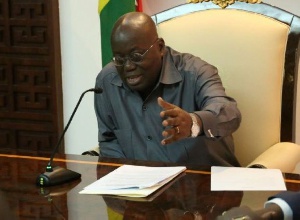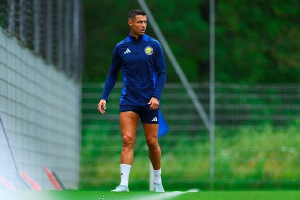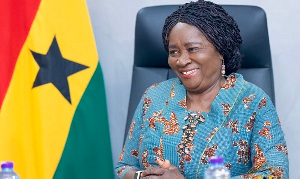The Presidential Candidate of the Opposition New Patriotic Party (NPP), Nana Addo Danquah Akufo-Addo has charged President John Mahama to tell Ghanaians how he will arrest the decline of the economy in his State of the Nations Address.
President John Mahama will appear before Parliament today to deliver the State of the Nation Address in fulfillment of the provisions of Article 67 of the Constitution.
It will be his third address as President of the Republic of Ghana.
In an exclusive interview with Citi News’ Raymond Acquah, Nana Addo insisted that the President should use this opportunity to give hope to the good people of the country who are in despair.
“We want to see what he is going to do about the state of our economy…we’ve become a deficit Ghana and we want to hear from him something positive as to what is being done to arrest the decline of our economy, give relieve to our people and then begin to put our country back on the growth of expansion. Those are the things that we want to hear about. Like any house you want to look at how solid the foundation is, the ideas that they put into the building of Ghana,” said.
This is what Mahama said about Ghana’s economy in the 2014 State of the Nation
BUILDING A STRONG AND RESILIENT ECONOMY
Economic Performance Mr. Speaker, despite the short-term challenges we face, our economic fundamentals remain sound and our mid-term prospects are good. Growth continues to be robust at an estimated 7.4% last year and we still retain our vision to accelerate and maintain GDP growth at above 8% going forward. The non-oil sector of our economy grew by 5.81 percent over the same period.
The agriculture sector in particular, which faced a few challenges the previous year, due principally to some difficulties in the cocoa sector, still posted a significant growth of 3.41 percent. That we are transiting into a services economy is apparent from the strong growth that continues to be posted by the services sector. The sector in 2010 overtook agriculture as the largest contributor to GDP and last year it posted an impressive growth of 9.1%.
The Industry sector, which has witnessed sluggish growth over the last couple of years, last year posted a remarkable increase of 9.2%. Mr. Speaker , since 2007 the world has been faced with a financial crisis and Ghana has not remained immune to the pressures created by this crisis. Recent tapering policy announced by the US Federal Reserve greatly impacted numerous emerging markets.
Ghana is one of those affected. Compounding this is the fact that several domestic factors have further aggravated the challenges with our macro economy: A larger-than-expected expansion in the wages and compensation bill during the implementation of the single spine created a wage spiral that we are working with organized labour to contain. Huge and unsustainable subsidies on petroleum products and utilities also threw the budget out of sync.
The net effect was an increase in our budget deficit to nearly 12%, an increase in inflation above 13%, an increase in interest rates, and also an increase in our domestic debt. Ghana is in the capital markets to stay. And we take note of the concerns that analysts have expressed about these developments, notably the compensation bill — including acknowledgement of the painful measures that our people are having to endure towards our consolidation effort. The visiting IMF Article IV mission (who I believe are here in Chamber with us) has also expressed similar concerns in the course of our interactions with them.
Mr. Speaker, it is for these reasons that we have had to take difficult measures to arrest this trend and restore the macro economy to good health. While these measures have been unpleasant and difficult to take, ultimately they are necessary to create a good economic environment in which businesses can continue to, not merely survive but also grow.
Mr. Speaker, we have had to take difficult measures to arrest this trend and restore the macro economy to good health. While these measures have been unpleasant and difficult to take, ultimately they are necessary to create a good economic environment in which businesses can continue to not merely survive but also grow.
It is an experience with which, I am sure, we can empathise in our daily lives. We have all, at some point, had to bear the taste of a bitter medicine in order to restore our bodies to good health. Mr. Speaker, I wish to assure this august house, and the good citizens of Ghana that as with the taste of any bitter medicine, this turbulence we are all being made to bear is temporary. We shall begin to see the benefits of the sacrifices we are making very soon.
Mr. Speaker, as a lower middle-income country in transition to middle-income status, we have an enormous need for credit to develop our social and economic infrastructure. Our debt to GDP ratio is currently estimated at 52%. While this is not abnormally high, our domestic debt and the current high interest rates are a major challenge to the economy. The Hon Minister for Finance is currently implementing measures to refinance a portion of the domestic debt, thereby reducing the pressures these obligations are placing on the budget. We have also commenced work on the Ghana Infrastructure Investment Fund.
This fund will enable us to disaggregate our debt profile and transfer infrastructure investments with a revenue generating capacity from the public debt. Institutions such as Ghana Gas, VRA, GPHA, GACL, GNPC and other public and private institutions would be able to finance their investments through this window without burdening the public debt stock. This should significantly improve our debt sustainability profile. We will work with our development partners and other multi-lateral associates to ensure that Ghana continues on the path of accelerated growth and equitable development into the future.
General News of Thursday, 26 February 2015
Source: starrfmonline.com













